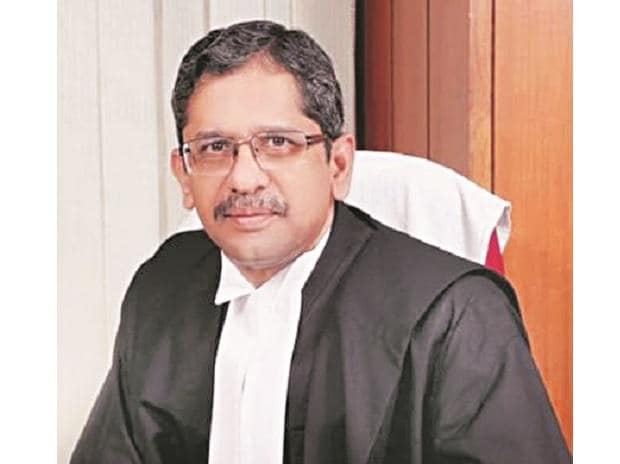Before being appointed to the SC, Justice Ramana held the positions of Chief Justice of the Delhi High Court and the Chief Justice of the Andhra Pradesh High Court (HC).
Born on August 27, 1957 in Ponnavaram Village, Krishna District of Andhra Pradesh, Ramana belonged to an agricultural family. As a student leader, he was actively involved in the protests against the 1975 Emergency.
He worked as a journalist before joining law. On February 10, 1983, he enrolled as an advocate. He practiced in the High Court of Andhra Pradesh, Administrative Tribunals of both the Centre and the state of Andhra Pradesh. He also practiced in the Supreme Court in civil, criminal, constitutional, labour, service, and election matters. He specialised in constitutional, criminal, service, and inter-state river laws. On June 27, 2000, he was elevated as the permanent judge of Andhra Pradesh HC. He was then made the Chief Justice of the Delhi HC on September 2, 2013, and on February 17, 2014, Ramana became a judge in the SC. He was recommended as the next CJI by his predecessor Justice SA Bobde in March, 2021. The President of India appointed Ramana as the 48th CJI.
Recent judgments
Justice Ramana is known for upholding civil rights. He has been part of various decisions ranging from women’s rights, electoral issues to bringing the post of the CJI under the ambit of the Right to Information Act. He led the bench on various matters related to the abrogation of Article 370 in Jammu & Kashmir, including the restrictions imposed on the people of the state. In a case related to the restrictions on media imposed in J&K, Justice Ramana said, “Responsible governments are required to respect the freedom of the press at all times... journalists are to be accommodated in reporting and there is no justification for allowing a sword of Damocles to hang over the press indefinitely.”
In another case related to granting bail under stringent laws like The Unlawful Activities (Prevention) Act, 1967, a bench headed by Ramana held the view that the restrictions under the Act “per se does not oust the ability of Constitutional Courts to grant bail on grounds of violation” of a fundamental right like that of a right to a speedy trial.
Allegations of corruption
Andhra Pradesh Chief Minister, Y S Jagan Mohan Reddy, in October 2020, wrote to CJI Bobde, alleging that Justice Ramana and his relatives were involved in corruption and Ramana was trying to destabilise his government. In November 2020, Attorney General of India, K K Venugopal refused to grant permission for investigation in the case. In March 2021, an in-house panel led by Justice Bobde dismissed the case clearing the decks for Justice Ramana’s appointment as the next CJI.

 CJI Ramana hails media for cooperation in disseminating information
CJI Ramana hails media for cooperation in disseminating information
UU Lalit promises year-round constitution bench, reforms in case listing
 Chief Justice N V Ramana leaves behind a 6.1% increase in pending cases
Chief Justice N V Ramana leaves behind a 6.1% increase in pending cases
 CJI Ramana calls pendency of cases 'huge challenge' for Indian judiciary
CJI Ramana calls pendency of cases 'huge challenge' for Indian judiciary
 Anubrata Mondal case: Bengal lawyers seek transfer of matter outside state
Anubrata Mondal case: Bengal lawyers seek transfer of matter outside state
 Discharged my duties in whatever way possible: Outgoing CJI Ramana
Discharged my duties in whatever way possible: Outgoing CJI Ramana
 'Why not call an all-party meeting to hear freebies' issue,' SC asks Centre
'Why not call an all-party meeting to hear freebies' issue,' SC asks Centre
 Legislation or court guidelines? Who will put freebies in a box?
Legislation or court guidelines? Who will put freebies in a box?
 'Factories of education' are causing devaluation of human resources: CJI
'Factories of education' are causing devaluation of human resources: CJI
 10 days left in office for CJI Ramana, five important cases await decision
10 days left in office for CJI Ramana, five important cases await decision
